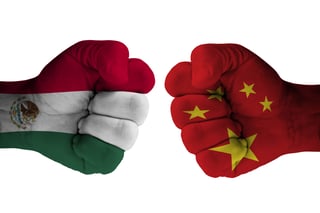While many manufacturers have outsourced to China due to low costs, a recent study from the Boston Consulting Group has found it may be smarter to begin offshoring in Mexico. In fact, the management consulting firm projects Mexico's economy will add between $20 billion and $60 billion in output by 2018 because of the competition to higher costs associated with suppliers in China and other major economies across the world.
Mexico's Advantage
The North America Free Trade Agreement has made it easier for organizations to offshore to Mexico. With the 44 trade agreements that Mexico has with countries around the world, shorter supply chains, and lower costs it makes sense for U.S. manufacturers to seek out partners in Mexico if they really want to improve the cost efficiency of their company.
"Mexico is in a strong position to be a significant winner from shifts in the global economy," said Harold Sirkin, a BCG senior partner. "That is good news not only for Mexico, which relies on exports for around one-third of its GDP. It's also good for America, since products made in Mexico contain four times as many U.S.-made parts, on average, as those made in China."
Mexico vs China Labor Costs
Cheap labor and high output used to be the reason many U.S. manufacturers were drawn to outsourcing to China. But now, top chief financial officers and other decision-makers are taking note of the higher labor costs in China and evaluating their options to nearshore to Mexico. A recent Reuters article reported on new research by Bank of America Merrill Lynch that revealed Mexico's hourly wages are about a fifth lower than China's. The average hourly wages of being nearly 20 percent lower in Mexico is a dramatic change from a decade ago when Mexico's hourly wages were 188 percent more costly than China's.
 Bank of America Merrill Lynch economist Carlos Capistran believes this competitive advantage that Mexico has built over China won't be going away any time soon. He predicts the growing labor market in Mexico will continue to make the country more attractive to U.S. manufacturers than China.
Bank of America Merrill Lynch economist Carlos Capistran believes this competitive advantage that Mexico has built over China won't be going away any time soon. He predicts the growing labor market in Mexico will continue to make the country more attractive to U.S. manufacturers than China.
"Today people are excited about Mexico because of the reforms, et cetera," Capistran said, according to Reuters. "But when I ask myself 'what is the most important thing that Mexico has today in terms of growth,' it's the demographic bonus."
Manufacturing Communities
Based on the findings of the BCG research, partnering with manufacturing comunities, or shelter companies, in Mexico may make even more sense for U.S. manufacturers in particular industries. The study forecasts the biggest production gains are expected to be in: transportation goods; computers and electronics; appliances and machinery. U.S. manufacturers that want to achieve lower costs, benefit from cheaper labor and can see higher levels of output should they give serious consideration to manufacturing communities south of the border.
"These industries have relatively high labor content, stringent logistical requirements, and strong existing manufacturing clusters in Mexico," said Eduardo León, a BCG senior partner based in Monterrey.
U.S. manufacturers that hope to achieve the highest possible cost savings should consider becoming part of a manufacturing community in Mexico. Not only are there skilled professionals located across the border, but they take over human resource management, import/export services and regulatory compliance. With manufacturing communities carrying out several business processes, and providing links and resources to economies of scale, U.S. manufacturers can focus on production. The comprehensiveness of these services, coupled with the rising cost of doing business in China, may make Mexico the most attractive expansion destination for manufacturers moving forward.
Subscribe
Sign up and stay informed with tips, updates, and best practices for manufacturing in Mexico.






